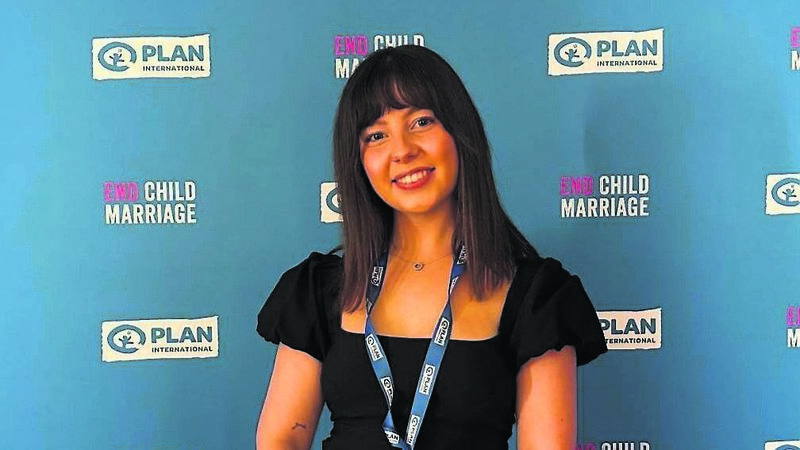Cork Views: My mission to stand up for girls around the world

Amy O’Brien, of UCC, is involved in the group PLAN, an organisation aiming to break down barriers to gender equality
The International Day of the Girl is celebrated annually on October 11 and this year it marked 30 years since the Beijing Declaration, which is the global blueprint for gender equality.
It is a worldwide celebration of the progress that has been made in securing many girls’ safety, dignity, education, and futures.
It is also a rallying cry to keep pushing for positive change until every girl’s rights are recognised and gender equality becomes reality.
International Day of the Girl is a call to action to share girls’ stories, to advocate for change, to make space for women to lead, and to lend all of our voices.
To highlight this, I would like to draw attention to the positive actions being taken in Ireland to progress girls’ rights from my perspective as a young person from Cork.
I sit on the Youth Advisory Panel for PLAN, an organisation aiming to break down barriers to gender equality. The theme and area of focus selected by PLAN internationally for Day of the Girl this year was ending child marriage.
An estimated 700 million women alive today were married as a child, and in almost all those cases, it was forced. Usually, the girl is married to a man older than her.
Often, there are huge health risks arising from child marriage due to the dangers associated with pregnancy at a young age, and because to keep the marriage secret, these women and girls are rarely brought to a hospital for a safe, monitored and sanitary childbirth, which can sadly lead to death.
It is estimated that more than 22,000 girls a year are dying from pregnancy and childbirth resulting from child marriage.
To raise awareness around this issue, PLAN Ireland organised the Irish premiere of Nawi: Dear Future Me in The Lighthouse cinema in Dublin. This impactful movie follows the tale of a young girl, Nawi, in rural Kenya who studies hard, excels in school and has always dreamed of going to high school. She regales us with all the different professions she aspires to become - lawyer, teacher, scientist, pilot, architect and so on.
Then, she finds out her father is selling her to a much older man for the bride price, reducing her to the worth of livestock.
The cinematography guides the audience as Nawi navigates her lost dreams, vulnerability, her strength and a fragile sense of hope.
After the screening, Caoilfhionn Gallagher, a human rights lawyer and Special Rapporteur on Child Protection, gave an astounding speech. She addressed the issues the film shone a light on and encouraged everyone in attendance to stand in solidarity with women and girls affected by child marriage and to use our voices to raise awareness.
After the premiere, the Youth Advisory Panel directed guests towards the ‘Dear Future Me’ letters on display from girls all over the world who had written to their future selves about the hopes they have for themselves and the aspirations they have for a better world. Their real-life stories were incredibly moving and re-enforced for me the importance of being an active feminist today.
Finally, we had a delicious Palestinian mezze and as people mingled, they discussed and debriefed the message of the film.
As part of PLAN, I hope content creators, politicians, speakers, youth advisors, PLAN staff and friends and family left more informed, aware and empowered to take action.
One of the names on the event guest list was TD Marie Sherlock. A month earlier, she had been involved in a discussion on another vital gender equality issue - period poverty.
It is essential period products are accessible in all bathrooms to ensure the dignity of people who menstruate. Currently, providing these products in schools is an essential step in the push to end period poverty.
Period justice is in the Programme for Government but there is very little tangible work being done on it. However, it has been wonderful to see some local businesses - restaurants, UCC and our libraries - have begun providing free period products. It’s also important they aren’t just available in bathrooms but are free as they should be as accessible as toilet paper. This is because there is an added financial burden on people who have periods that perpetuates patriarchal inequality.
Beyond this, there is also an emotional burden. For example, most women, girls and people with periods can probably relate to having been unprepared on occasion, feeling stressed and needing to have an awkward interaction with a stranger, a colleague or friend in the bathroom to ask for a period product.
There’s also a myriad of social reasons why period justice matters. Not everyone has someone at home whom they feel comfortable enough with to turn to and ask them to buy period products. It has been reported that girls have stayed home as they didn’t have the resources to go to school with their periods, creating a barrier to girls accessing education and equal opportunities.
Furthermore, this issue feeds into a wider conversation about women’s health in Ireland, for example, people with endometriosis often struggle to get support or due attention in our health care system.
Finally, by having period products freely available and on show, particularly in all school bathrooms, it would help to destigmatise periods in Ireland.
On September 9, a couple of representatives from PLAN travelled to Leinster House for a meeting with Marie Sherlock about period justice. I spoke on behalf of the young people who were advising PLAN and the girls being impacted by this inequality in Ireland.
We discussed ways in which she could help us advance our campaign and we were delighted with her degree of support. From PLAN’s perspective, it was also a chance to ask her advice, as someone in the Dáil, on what our next steps for this campaign should be. Her political insights were immensely valuable and she provided us with really helpful advice on how to meaningfully push for our goal of period justice.
That Saturday, I travelled to Dublin for a Youth Advisory Panel meeting with PLAN. I was given time to tell the other young people who advise the organisation about the meeting in Leinster House, and also about the fantastic International Day of the Girl event.
I hope you have enjoyed reading about my voluntary work as a feminist and learned about the incredible work PLAN are doing in Ireland to make this country a fairer place for women and girls.
I’d like to leave you with a few words from one of the ‘Dear Future Me’ letters we displayed at the Lighthouse Cinema. Djamila, from Guinea, wrote: “I want a world where we no longer need to denounce, because justice will prevail. I want a world where we no longer have to fight, because girls’ rights will be evident. But until that day arrives, I will continue to fight, to denounce, to support victims and to support the organisations working in communities.
“Dear future me, if you’re reading this letter, I hope you’re living in a better world. But if this fight isn’t over yet, then remember: our voice will never be silenced.”







 App?
App?




